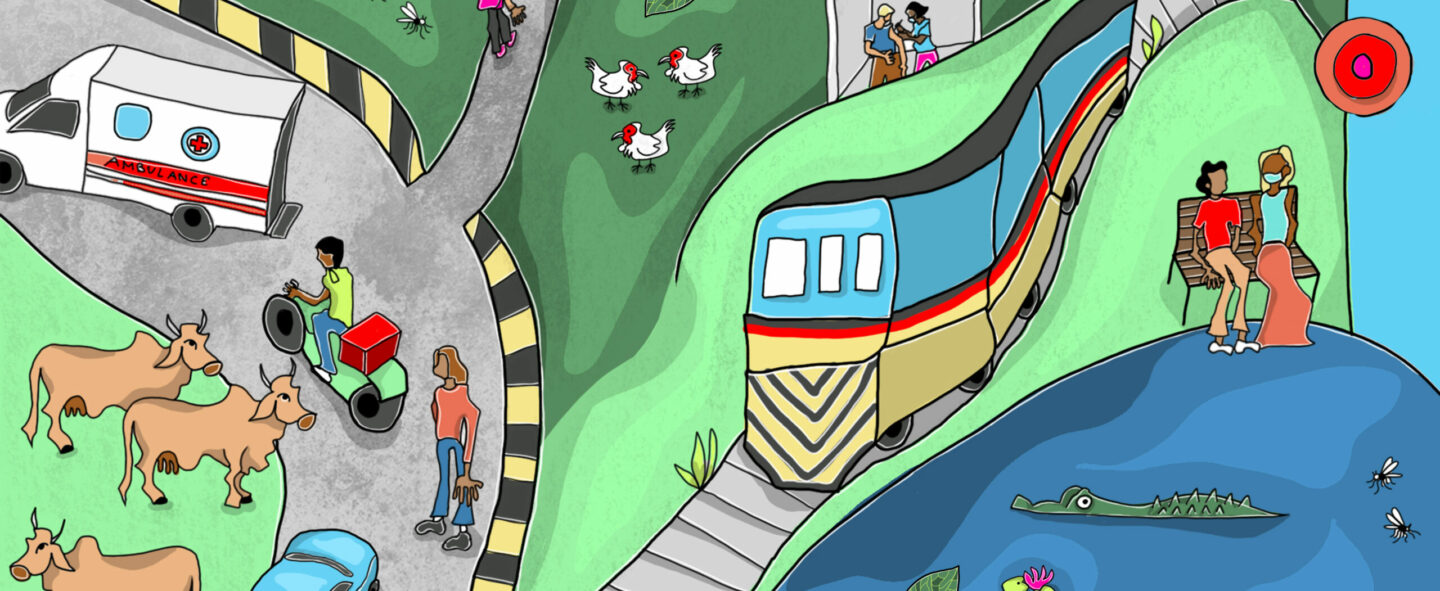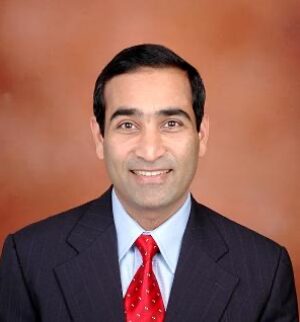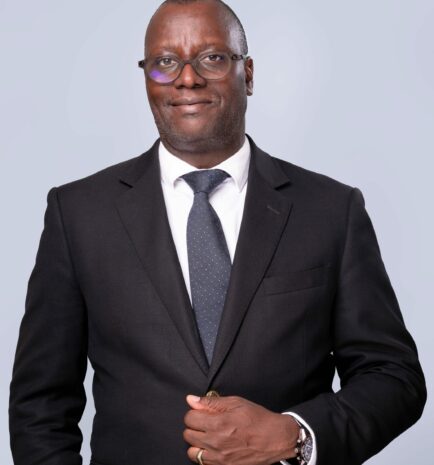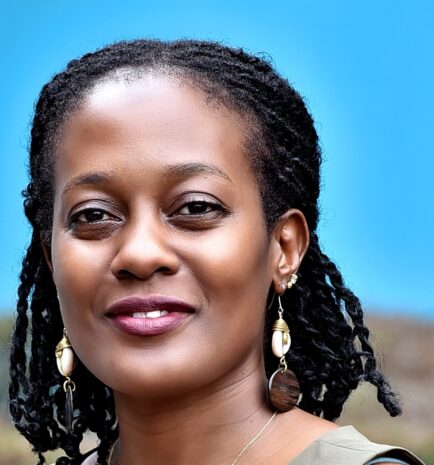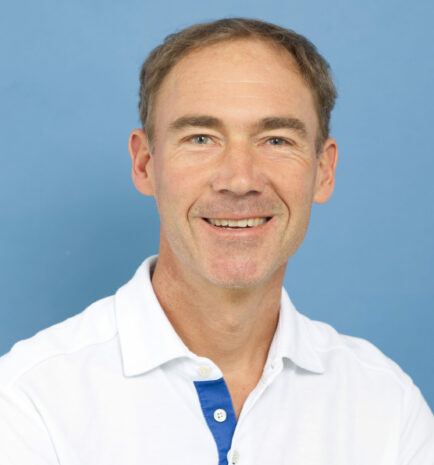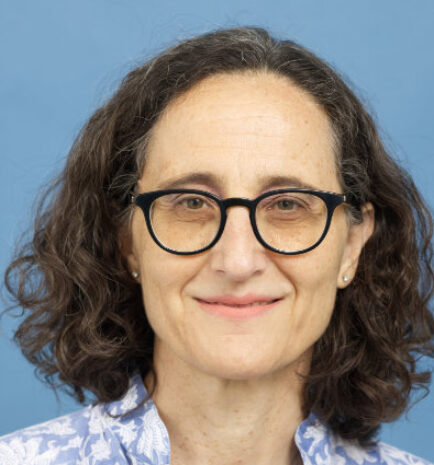
Dr. Lena Robra
… And we need to find new ways to nurse everything and everyone back to good health.
For decades now, as human beings, we have placed ourselves at the centre of the universe. It is only in recent years that we’ve realised that our existence is at stake. In the face of climate change, governments across the world have started to discuss potential measures in an effort to protect human existence. However, we all know that those aren’t nearly enough. We cannot expect mankind to survive if we look at our needs and expertise in isolation. We must turn the lens away from us, zoom out and look at the bigger picture, and work across disciplines to be able to make life on earth possible for future generations. This is precisely what we aim to achieve at the Trialogue Days—Planetary Health from Different Perspectives. The essence of this event lies in our efforts to enable people to expand their thinking by taking into account knowledge from other disciplines across different settings and generations.
Human health depends on environmental and animal well being, as well as halting and eventually reversing global warming and climate change. All our actions and behaviours determine the possibility of future life on the planet and are closely interlinked. The goal of Trialogue Days is to develop relatable and actionable measures and commit to addressing issues by implementing these initiatives.
And more importantly, how can we work with planetary health?
The ongoing climate crisis is manifesting itself more and more strongly and in many ways. Let’s look at this through a few examples. Burning fossil fuels, which started with the Industrial Revolution in the 18th century and is considered to be the start of global warming, contributes to air pollution, which then exacerbates respiratory and cardiovascular diseases. Pollution also affects the entire ecosystem cycle—it reduces soil and water quality, harms wildlife and shrinks agricultural productivity. This then leads to a loss of natural habitats which further leads to loss of biodiversity and an increase in risk of zoonotic diseases (diseases that have their origin in a non-human species but can crossover to humans, such as the Covid-19 virus) and disease outbreaks, which have massive consequences for human and animal health. Another example of a global issue that can only be effectively addressed through the Planetary- and One Health-approaches due to its complex nature is antimicrobial resistance (AMR).
Then there is the matter of extreme weather—one of the most visible effects of climate change that we experience in our daily lives. People are moving across borders due to forced migration caused by an increase in extreme weather events, and the impacts of climate change such as prolonged drought periods and shifted monsoons which render agricultural livelihoods impossible. This disproportionately affects low- and middle-income countries because they are least equipped to deal with the consequences due to poor public infrastructure and lack of support from the government. This issue again needs to be looked at from different perspectives across disciplines.
Our bit, we’d like to think.
From December 1 to December 5, a multidisciplinary gathering of experts and innovators from diverse global backgrounds will work together to engage in discussions on planetary health. Experts in human health, biodiversity, and sustainability from India, Switzerland and Uganda will exchange ideas to enable a holistic understanding of the challenges affecting our planet. Over the course of five days, the dialogue will aim to stimulate the generation of innovative solutions and inspire new strategies by way of collaboration and knowledge sharing. Participants will not only present their research but, above all, will be encouraged to step out of their comfort zones to tackle unfamiliar contexts and take collective responsibility.
By sharing your ideas with us and contributing to finding solutions.
I. Young Minds at the Forefront
If you’re a Bachelor’s, Master’s or a PhD student from India, Uganda or Switzerland, you can participate in the Trialogue Days by applying here with your research and ideas in an elevator pitch format.
II. Planetary Book
Don’t worry if you don’t have a pitch. If you care about the planet and its overall health and also have burning questions that nobody’s answering, we can help. Ask your questions here and we’ll publish them with responses from experts participating in the Trialogue Days in a book about planetary health in collaboration with Pratham Books.
III. #PlanetRoast Challenge
We’re going to air out our frustrations with the planet, with pollution, with food shortage, anything that we don’t understand about the state of our planet right now. And then in a few months, researchers from Switzerland, India, Uganda and other countries will work on answering those in an illustrated book.
What are the rules, you ask?
1. Fill out this form with your question about planetary health.
2. Upload a video of yourself “roasting” the planet on LinkedIn, Instagram or Youtube.
3. Tag us @SwissnexinIndia on Instagram and LinkedIn.
4. Use the hashtags #PlanetRoast & #PlanetaryHealth
Bio
Prof. Utpal Tatu is an Indian molecular biologist and biochemist, serving as Professor and Chairman of the Department of Biochemistry at the Indian Institute of Science. He specialises in human, animal and zoonotic infectious diseases such as malaria, babesiosis, giardiasis, trichomonosis, trypanosomosis and rabies, focusing on neglected tropical diseases of global importance. A key advocate of One Health, Utpal promotes collaborative strategies to combat infectious disease outbreaks. He is an elected fellow of the Indian Academy of Sciences and has received the Birla Science Prize, the Ranbaxy Award and the National Bioscience Award for Career Development from the Department of Biotechnology of India, recognising his significant contributions to the field. He also serves on the advisory board of the One Health Initiative of the University of Zurich.
Bio
Dr. Andrew Kambugu is the Sande-McKinnell Executive Director at the Uganda Infectious Diseases Institute (IDI) at Makerere University. A Ugandan physician and researcher, he specialises in infectious diseases and is a Fellow of the Royal College of Physicians. Andrew has held various leadership roles at IDI, including Head of the Research Programme and Head of the Prevention, Care, and Treatment Programme. He has authored over 30 peer-reviewed publications and currently serves as the president of Researchers for Global Health (R4GH), a global health research consortium.
Bio
Dr. Christine Sekaggya is an Internal Medicine Physician at Mulago National Referral Hospital and a Senior Research Scientist at the Infectious Diseases Institute, Makerere University College of Health. Her research focuses on HIV, tuberculosis (TB) and non-malignant haematology. She has led clinical trials and pharmacokinetic studies related to tuberculosis drugs and has conducted case-finding studies involving community health workers and private pharmacies for TB screening. Additionally, she has worked on projects aimed at integrating the management of non-communicable diseases within TB care. Christine is also a member of the WHO Sustainable Development Goals (SDG) Target Product Profiles for tuberculosis diagnostics and serves on the WHO Technical Advisory Group for dosing of tuberculosis drugs.
Bio
Jan Fehr is a Professor of Global Health & Mobility and Head of the Department of Public & Global Health at the Epidemiology, Biostatistics and Prevention Institute (EBPI) at the University of Zurich (UZH). He is also Chief Physician at the Centre for Travel Medicine (ZRM), the only WHO Collaboration Centre for Traveller’s Health. Jan specialises in internal medicine and infectious diseases, focusing on global health challenges through collaboration with partners in the Global South. His research interests include HIV, tuberculosis, viral hepatitis, vaccinology and emerging infectious diseases. He is a One-Health delegate for UZH in the UNA Europe Alliance and serves on various committees related to vaccination and travel medicine.
Bio
Dr. Lena Robra has been heading the Academic Engagement team at Swissnex in India since 2021. She is a trained biochemist who now connects the dots between Switzerland’s research and education ecosystem with India but occasionally also extends to South Asia or the African continent. She has a strong interest in antimicrobial resistance and constantly thinks about engaging ways to connect people and experts across disciplines. Before she joined Swissnex, Lena led the Bengaluru Sustainability Forum, an entity formed by Bengaluru’s academic institutions aimed at bringing the UN SDGs to the local context. She holds a PhD in Biology from the National Science Institute/Tata Institute of Fundamental Research.
Bio
Dr. Valerie Luyckx is a Senior Scientific Officer in the Department of Global and Public Health at the University of Zurich. She is a nephrologist with a background in public health and global health ethics, having practised across multiple health systems. Her work focuses on ethics and priority setting for kidney disease care in resource-limited settings. Valerie advocates for the prevention of non-communicable diseases (NCDs) and the promotion of kidney health through the attainment of the SDGs, emphasising the connections between poverty, infections, maternal health and the environment in relation to NCDs. Additionally, she champions quality kidney care through education and local capacity building.
Dr. Lena Robra
